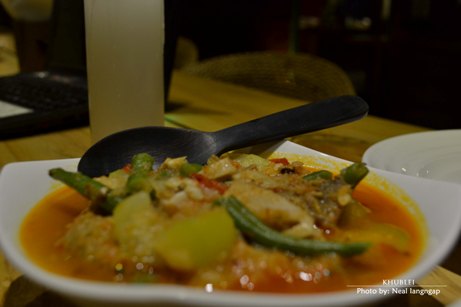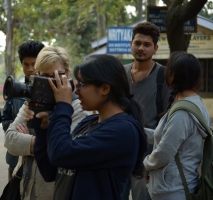It's happening again. A familiar rage unfolds its sticky wings within the captive interior of my chest: a monstrous butterfly emerging gracelessly from its cocoon.
It's the same every night. The taste of panic blooms bitter on my tongue. Swallowing hard, I wonder how much longer I can bear this charade.
I sculpt my features into submissiveness by a sheer act of will, reminding myself sternly that it's only during dinner that I must endure your company. It is the one meal that we eat together; indeed, the only time of day that we are even in the same room. I have tapped unexpected creativity to find excuses for wandering away after you return home from work. I disappear to the far ends of the house, carefully casual in my movements so as not to attract unwanted attention.
You haven't noticed my reaction now, either. You never do. Spooning your food onto that ridiculous brass platter that you insist on using, you proceed to eat it in the familiar, methodical, maddening sequence that supposedly provides optimal nutrition. You are obsessed with your health. Now in your fifties, you want to live forever.
Ayurveda has provided the answer, as far as you're concerned. Returning to the ways of our ancestors, you call it. The frugality of the system suits you: an approach both pure and puritanical.
You can spare me the lectures, I know all about it. How many times have you droned on about the principles of food preparation—haranguing me about the spices to grind and add in specific proportions, which fresh herbs to use for a particular dish, and so on, and so endlessly on.
Thanks to you, I've spent years learning about the medicinal benefits of plants. But time spent gathering knowledge is never wasted.
My attention returns unexpectedly to the present, as you actually tell me that something tastes good. But it's too little, too late. I am tired of it all now—of your endless complaints, your chronic self-absorption.
My impatience to get away begins to spiral out of control. Your words are gradually crowded out by the kalbaisakhitaking over my brain. Soon, I will hear nothing but the relentless raindrops beating a wild tattoo against my shuttered skull, as I clench my teeth from the effort of keeping the whirling winds of rage at bay.
Unaware of my traitorous thoughts, your lips continue to move. They flap in the quickening breeze, while that insidious inner voice of mine mocks every move you make: your preoccupation with your irregular bowels, your mother's opinions on everything, your brother's financial success that you profess to admire, yet resent so deeply.
When I married you, I was the awkward daughter in my accomplished family. Not academically inclined despite my professorial parentage, nor light-skinned and graceful as we are bludgeoned into believing that a deshiwoman should be.
More than two decades older, turmeric-stained by the remnants of a failed marriage, you were nevertheless deemed a catch for a girl like me. With neither beauty nor intellect to recommend me, my parents were happy at what they considered a fair exchange: a youthful bride who would restore your status as a "real man", in return for my guaranteed salvation from the disgrace of potential spinsterhood.
In the beginning, I was too inexperienced to know what to expect. I had merely hoped to escape the smothering weight of doomed parental expectations—to begin living a life of my own, however ordinary. Any references I had were drawn from the starry-eyed heroines of the Mills and Boon romances that I was so addicted to.
But ten dreary years, the despair of continuous boredom, and three miscarriages later, I have come to realize that this is no Cinderella story. You are hardly a saviour. Not even much of a man, really.
I wish I could have just left you. But my parents would never have provided shelter to such a disgraceful daughter. And I had little faith in my own skills. A knowledge of the more arcane aspects of botany doesn't count for much in the modern-day job market.
No, initiating the departure from my marriage would have been an excruciating process—involving a series of post-mortems and recriminations, warnings and wishful thinking about second chances. So I found another way.
You will be the one to leave me, though not just yet. You will die.
Daturaand Aconite are well-known herbal toxins, but there are many other, more obscure, "witches' weeds" tucked away in the depths of the manuals, awaiting discovery by a discerning scholar. In the end, I found the perfect one.
In tiny doses, Mitracorumis undetectable. And highly effective—there are no visible side-effects until the final moments. I can vouch for the truth of those claims. Since I started, you haven't displayed so much as a diminishing of appetite for the "pure-veg" pap that you insist on inflicting on us both, let alone signs of poisoning.
To assuage my fraying patience, all I have to do is dwell on the years of freedom that lie ahead. I am no longer bothered by pangs of conscience—they suffocated long ago under the obese weight of your demands. The benefits of being a too-young bride are now becoming evident to me.
They are further enhanced by your miserly habits, which have guaranteed me a solvent future as your grieving widow. And when that time comes, I will finally be free of those who have for so long controlled my life in the name of respectability. All I need is a little more patience.
The storm will break soon. But I am ready, waiting in my bunker, yearning for its arrival.







































